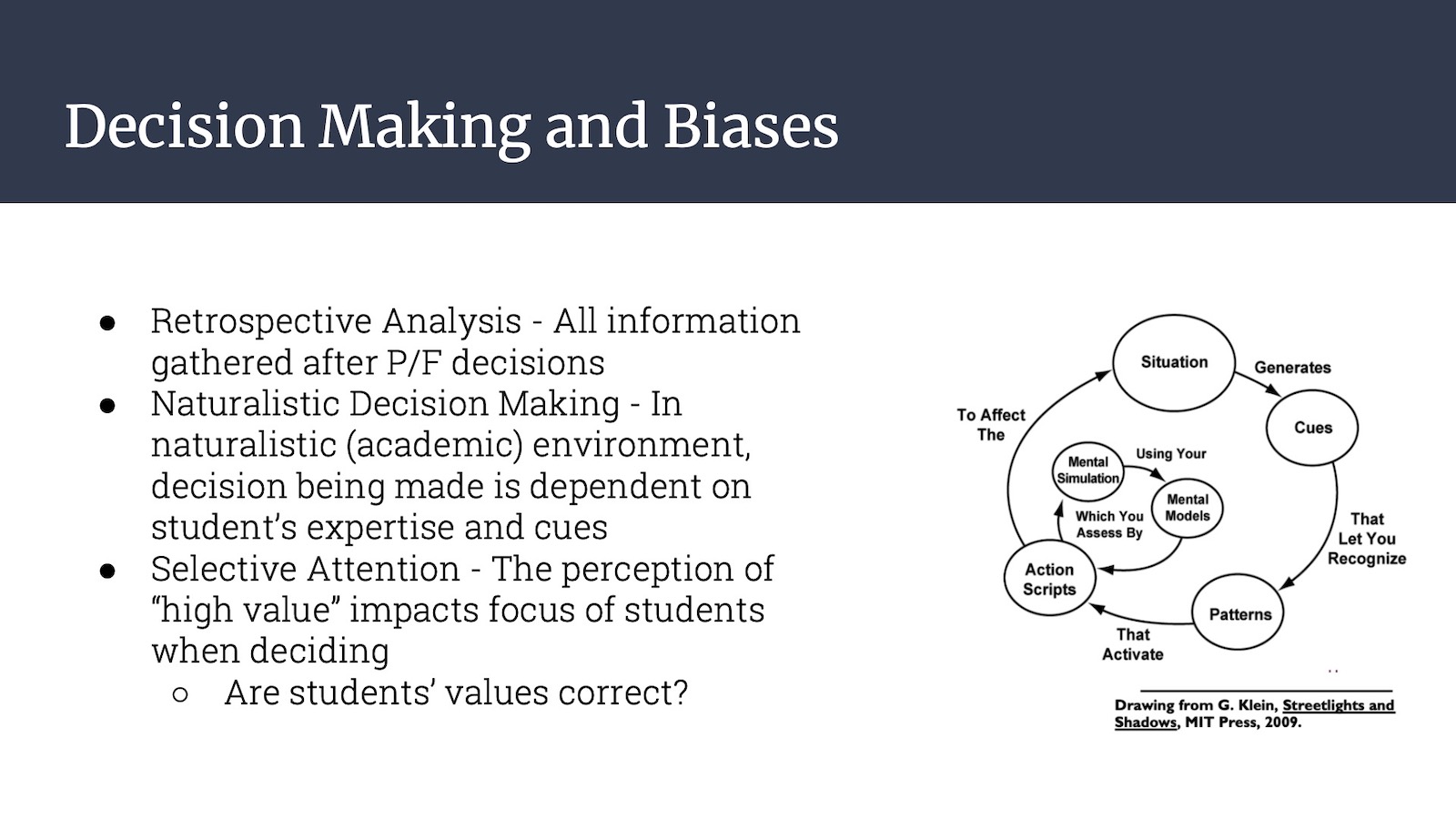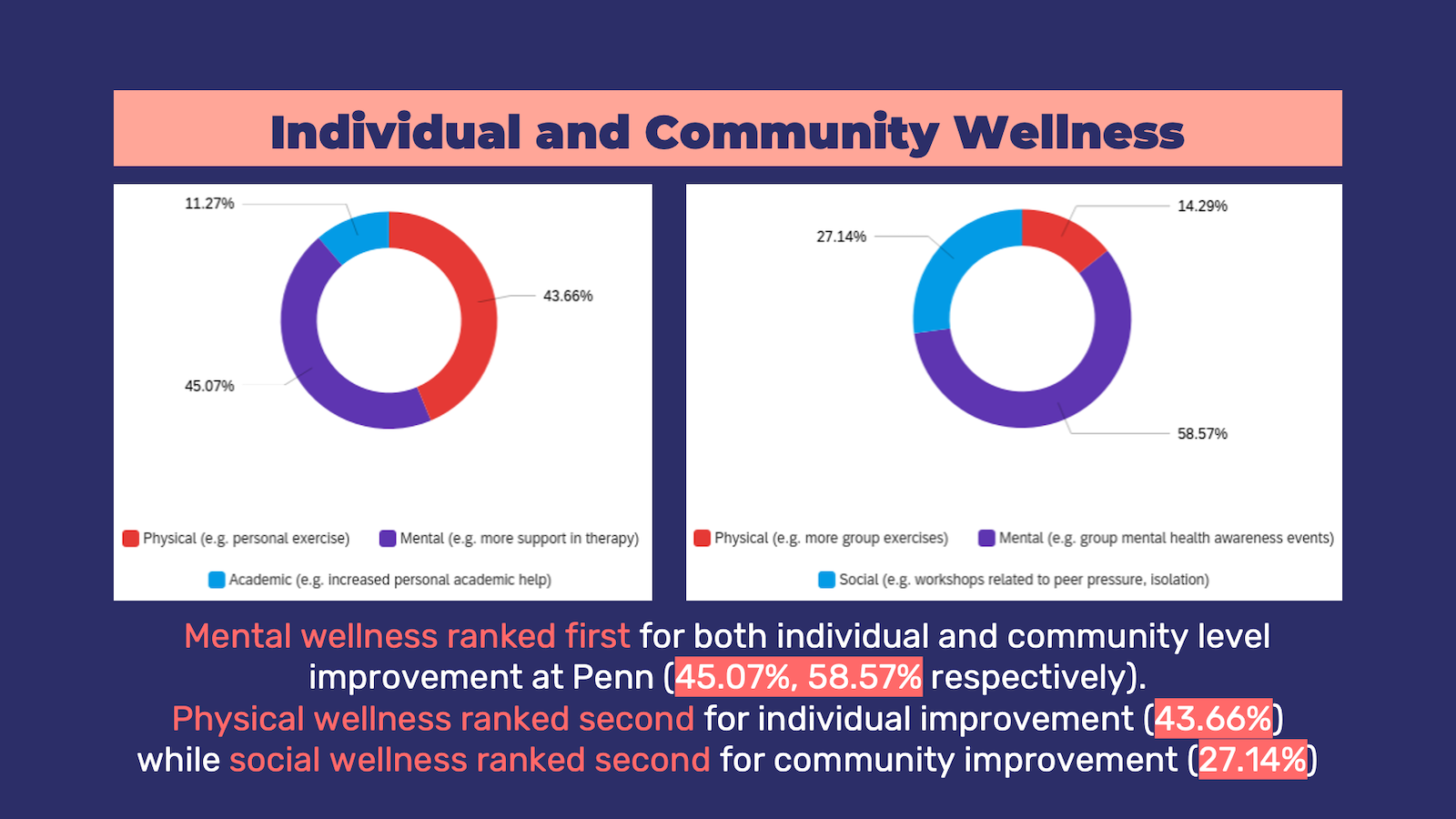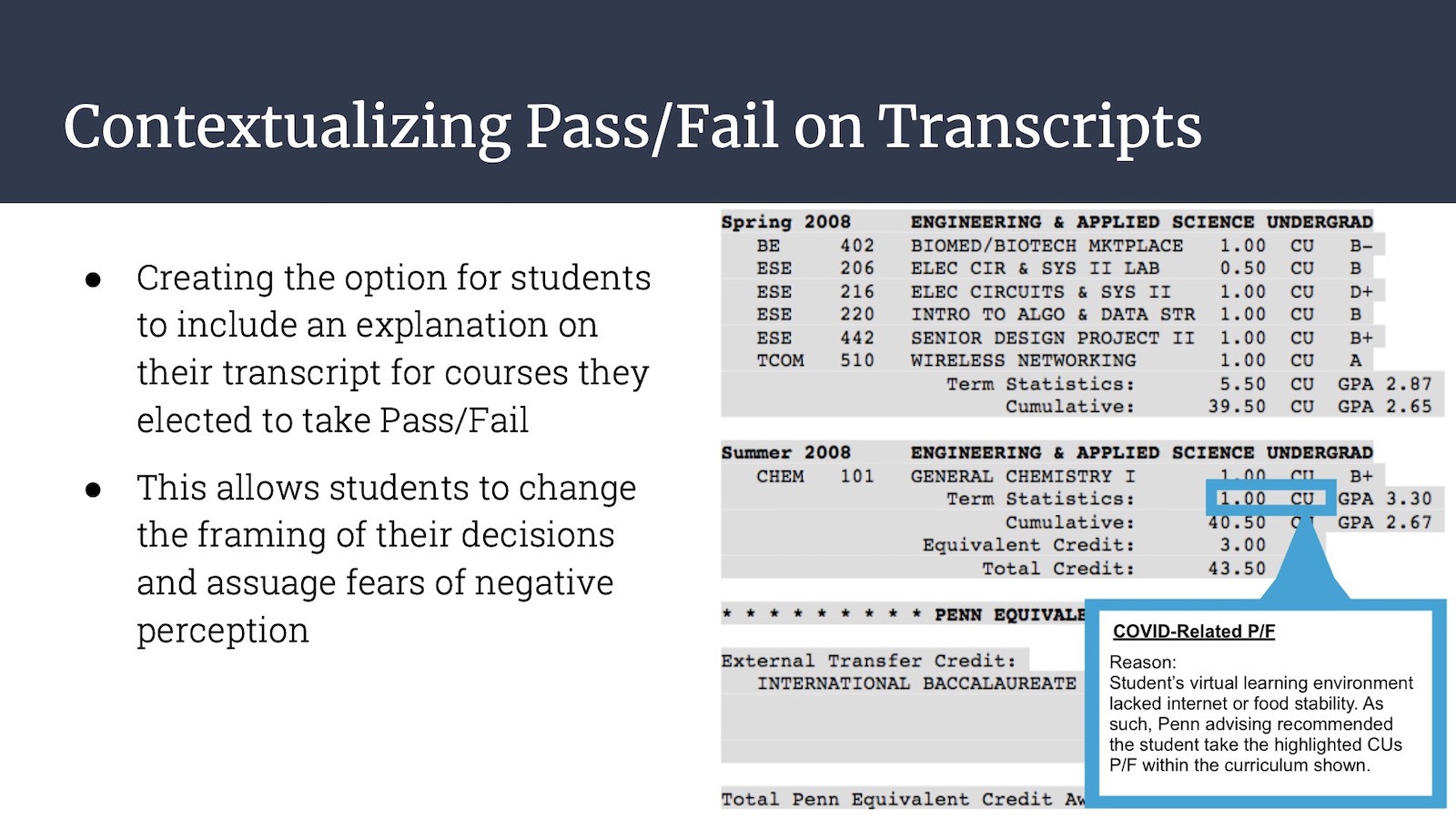The word “paideia” which means educating the whole person underscores the SNF Paideia Program’s commitment to dialogue across difference as supported by attention to service, citizenship and wellness. The SNF Paideia program sees individual and community wellness as integrated, and wants to explore the different ways this connection can be better understood, especially through diverse disciplinary explanations. Using this lens, the SNF Paideia program asked Dr. Won’s students to examine wellness at Penn. What kind of systemic changes or what ways of measuring wellness could be designed to contribute to our understanding of the connection between individual and community wellness with the hopes of helping Penn better mitigate student burn out? Should changes come from the top down or the bottom up to best influence Penn’s culture around student burn out and wellness?
Two Approaches, One Rubric
The students were organized into two groups, each working independently to interpret the question and design their analysis. After meeting once with Dr. Leah Anderson and Dr. Lia Howard to hear more about the SNF Paideia Program and to answer any questions they had, students set off to design projects that tackled different dimensions of wellness and student burn out. They were tasked with using the principles of Human Systems/Human Factors Engineering to examine the cognitive and systemic factors that contribute to stress and burnout, and propose strategies to improve student wellness.
How Wellness and Burnout are Impacted by Pass/Fail
Liam Hosey, Megan Chambers, Rafal Promowicz, Jessica Lail, and Ben Robinov, narrowed the topic to look at the effects of Pass/Fail on student wellness. The team chose this topic in-part because the Pass/Fail option has been offered more widely at Penn during the pandemic with the intent to help mitigate potential adverse effects of virtual learning. Yet, students report an increased level of stress around the decision of taking a course Pass/Fail. Given the heightened awareness of the relationship between stress and the decision to take a course as Pass/Fail, the group hypothesized that altering the way in which the University implements Pass/Fail could improve overall student wellness.

The team examined existing research and collected survey data from current Penn students to gain a better understanding of student attitudes toward the Pass/Fail offerings as well as its effects on student wellness. Liam Hosey, EAS’21, majoring in Computer Science shared his thoughts on the project, “This was a chance to reach out to the student body in a really hands-on way. As you can imagine, our peers had a lot to say. We got a flood of responses from our initial survey, and we were pleasantly surprised with how forthcoming students were with their own feelings and suggestions.”Follow-up interviews were conducted with two of the survey respondents as well as two HR professionals. The goal of these later interviews was to determine the importance of taking courses Pass/Fail versus for a grade in the context of being recruited for full-time roles after graduation (and for internships). After analyzing the results of the surveys, the team developed a series of practical recommendations for how to improve the administration of Pass/Fail. Included in their recommendations was adjusting the decision-making deadline to later in the semester, allowing students “more information regarding their grade in the course and more clarity on the impact their decision might have on recruitment and admissions decisions.” Other suggestions included reframing communications around Pass/Fail options, arming students with better information about potential impacts to help inform their decision-making process, and making a special note on transcripts contextualizing the Pass/Fail in light of the pandemic.
Penn Face and Student Wellness
Sraavani Akarapu, Siddarth Jaiswal, Maggie Zhang, Hyewon Lee, Tom Borgese, Zhehao Liang approached the question by tackling “Penn Face”, the tendency of Penn students to mask their stress, leading to a lack of social support and eventual burnout. Through their analysis the group addressed the following:
- How do communities impact individuals? (Impact)
- What demographic and qualitative/quantitative features of an individual are correlated with their relationship with wellness and burnout? (Correlation)
- How do students feel about their current resources? (Assessment)
- What improvements do students want to see? (Improvement)
They put together a questionnaire using survey design skills they learned in the course. The questionnaire was administered to 75 respondents. The questions focused both on individual and community wellness, with sub-sections including physical, mental, academic social, and environmental factors. They also asked respondents to list their school (of the four undergraduate schools at penn) and whether they self identified as FGLI.

After analyzing the data, they proposed some clear steps towards addressing wellness at Penn. Focusing on boosting the utilization of resources already available, they proposed methods for increasing awareness and attendance at wellness events; integrating wellness programming during freshman orientations; using school and organization communication channels to promote wellness programs.
Reflecting on his group’s project, Siddharth Jaiswal EAS’21 shared, “working with Paideia to tackle the issues of burnout and wellness was a very rewarding way to apply our learning from Professor Won’s ESE 543 course. Every Penn student has their own experience with stress and mental health, but we usually don’t have the opportunity to influence the resources Penn provides. So, when we had the chance to do just that, we tried to make the most of it by testing eight different hypotheses through a campus-wide survey and measuring wellness metrics across class years, schools, and more. We used the implications from this data analysis to devise new ways for Paideia to make a more sustained impact on Penn students, and we had a great time working with and presenting our ideas to Dr. Howard and Dr. Anderson from Paideia.”
Next-steps for the Wellness Consultation
SNF Paideia coordinated a presentation by the students to the Senate Committee on Students and Educational Policy (SCSEP) in the Office of the Faculty Senate. Carol Muller, 2020-2021 Chair of SCSEP reflected on the presentation,
Hearing from Dr. James Won and his two teams of student researchers was a highpoint of our committee meetings this year. The research was excellent and provided important insights into the wellness challenges confronting students. We hope to see more of this combined qualitative and data driven faculty-student partnership research into all aspects of student wellbeing on campus. What a great model.
The students also appreciated the opportunity to present their work to SCSEP. “Not only were we able to develop novel improvements to how Penn handles pass/fail, but SNF Paideia then gave us a chance to share our findings with the Faculty Senate. They recognized that our research had applications outside the classroom, and worked to give it an audience with people who could hopefully do something about it.” Said Liam Hosey, EAS’21. Echoing these thoughts, Jessica Lail, EAS’21, shared, “For me, one of the most enriching aspects of this research experience was the opportunity to present our findings about the effects of Pass/Fail on student wellness to the Faculty Senate (SCSEP committee). The committee’s willingness to listen and learn about our research showed that our work was truly valued and respected. I am hopeful that the research my team conducted will challenge Penn to reconsider the framing of Pass/Fail.”

Going forward, SNF Paideia is excited to work with Dr. James Won and the students in his ESE 543 course to further examine student wellness and burnout. Dr. Won reflected, “It has been such a blessing to partner with SNF Paideia to help provide a different perspective towards this all-important issue. It has been so rewarding to see my students take course concepts and apply them in such an effective way. I’m grateful for the mission of SNF Paideia, and for the opportunty to partner together to care for and support our precious students.” Dr. Won’s students likewise saw the benefits for the partnership,
I know that the lessons learned in this course and through this research experience are ones that I will carry with me into the next stages of my life. ~Jessica Lail, EAS’21
The SNF Paideia Program is grateful for this collaboration and for Dr. Won, who proposed the partnership. Dr. Won’s students put their course work in direct conversation with wellness and in so doing demonstrated one powerful way to be good citizens of the Penn community. We look forward to the opportunity to continue to learn from and be inspired by Dr. Won’s future students in ESE 543 Human Systems Engineering.




